Knockout Roses are particularly well-suited to a variety of companion plants, such as shrubs, flowers, and ferns, which complement their attractiveness and offer aesthetic value to the yard.
They may be used with a variety of shrubs, flowers, and foliage plants to create a visually pleasing environment, such as Lavender, Catmint, Salvia, and Daylilies. The brilliant flowers and appealing growth habits of Knockout Roses make them flexible companions that integrate nicely with many other plants, giving charm and color to the landscape.
Knockout Roses (Rosa ‘Knock Out’) is a popular and long-lasting rose cultivar that blooms continuously throughout the growing season. They require little care and are resistant to typical rose diseases like black spots and powdery mildew.
Their blossoms come in a variety of red, pink, and yellow tones, bringing a pop of color to any landscape. They may grow in a variety of garden settings because of their modest water requirements and adaptation to diverse soil conditions. Knockout Roses are noted for their high pest resistance, making them an ideal choice for gardeners looking for gorgeous, low-maintenance plants.
So in this article, We will be looking into the Twenty Six (26) Good companion plants for knockout roses and also Six Bad companion plants for Knockout roses and the reason why they are good and bad for Knockout roses.
Table of Contents
Good Companion Plants for Knockout Roses
Herbs
1. Lavender (Lavandula spp.)
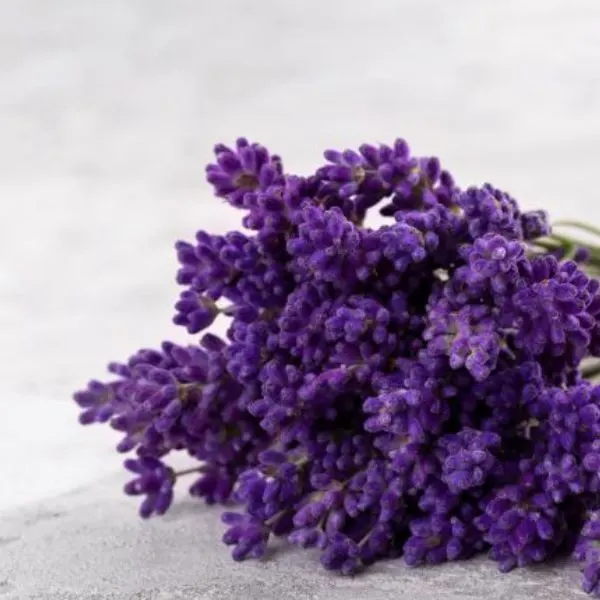
Lavender is a wonderful companion plant for Knockout Roses, providing a variety of advantages that contribute to a successful garden. For starters, lavender has a pleasant aroma that functions as a natural insect repellent, deterring pests that may otherwise attack the Knockout Roses. The fragrance characteristics of lavender can attract helpful insects such as bees and butterflies, aiding pollination and improving the general health of the garden.
Lavender’s somewhat higher, and airier growth habit compliments the dense and bushy shape of Knockout Roses, offering a pleasing contrast in textures and visual intrigue. The deep-rooted nature of lavender also helps to improve soil structure and water retention, producing a suitable environment for both plants to thrive. Lavender’s pest-repellent qualities, pollinator attractiveness, aesthetic harmony, and soil-enhancing characteristics make it an excellent companion plant for Knockout Roses.
Knockout Roses reciprocate the companion relationship’s advantages, positively affecting the development and well-being of lavender. Because roses generate extensive foliage, they may provide much-needed shade and shelter from direct sunshine, protecting lavender from potential heat stress.
Knockout Roses’ thick growth functions as a natural barrier, suppressing weed development and decreasing competition for resources, allowing lavender to spend its efforts on strong growth and flowering.
Roses have a deep root structure that enhances soil aeration and general soil health, which helps lavender growth directly. The rose blossoms also offer nectar, attracting pollinators that aid in the pollination and seed generation of lavender. Knockout Roses provide protection from severe weather, weed reduction, soil improvement, and pollinator support in this mutually beneficial partnership, establishing an environment in which lavender may live and flourish.
2. Catmint (Nepeta spp.)
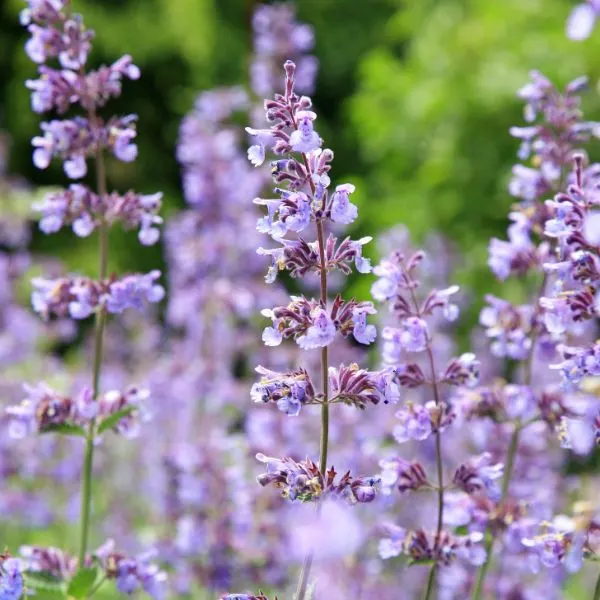
Catmint is a wonderful companion plant for Knockout Roses, offering a variety of benefits that contribute to a successful garden. One of Catmint’s key advantages is its pest-repelling leaf, which works as a natural repellent to many common garden pests. Knockout Roses are less prone to pests when surrounded by catmint, allowing them to flourish healthily without the need for chemical pesticides.
Catmint’s beautiful blossoms attract important pollinators like bees and butterflies, improving overall pollination and increasing the production and quality of rose blooms. Catmint’s compact and mounding growth habit contrasts well with the upright shape of Knockout Roses, bringing interest to the garden scene. Its capacity to survive in settings comparable to roses guarantees that both plants may cohabit amicably while limiting competition for key resources such as sunshine and water.
Knockout Roses help the catmint by providing shade and wind protection with their thick foliage, sheltering the fragile catmint leaves from the blazing sun and severe wind exposure. The solid growth of Knockout Roses provides a natural support system for the spreading branches of catmint, helping to keep them aloft and away from the ground. The deeper root structure of the roses improves soil aeration and nutrient circulation, resulting in healthier catmint growth.
The appearance of vivid rose blossoms attracts important pollinators like bees, which unintentionally approach and pollinate surrounding catmint flowers, ensuring their healthy reproduction. Knockout Roses generate an atmosphere that promotes and encourages the growth and well-being of catmint plants, resulting in a complimentary and happy companion relationship.
3. Oregano (Origanum spp.)
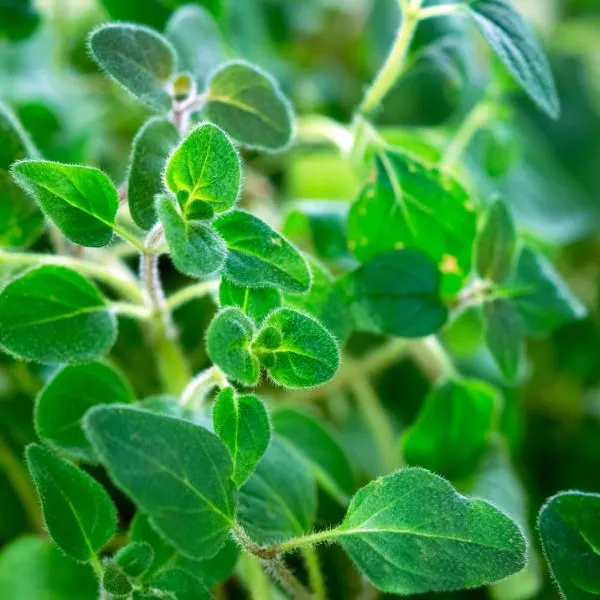
As a companion to Knockout Roses, oregano has various advantages. Its scented leaves operate as a natural pest repellant, protecting the roses from common garden insects.
Furthermore, the small, delicate blossoms of oregano attract helpful pollinators such as bees and butterflies, assisting in pollination and encouraging healthy bloom growth in roses. Oregano’s compact growth pattern contrasts nicely with the bushy appearance of Knockout Roses, providing interest to the garden environment.
Oregano’s shallow root structure allows it to cohabit alongside roses without competing for resources. It is a culinary herb, making it a useful and tasty addition to the garden while improving the beauty and health of Knockout Roses through pest-repelling characteristics, pollinator attraction, visual harmony, and ease of cohabitation.
Ornamental Plants
4. Salvia (Salvia spp.)
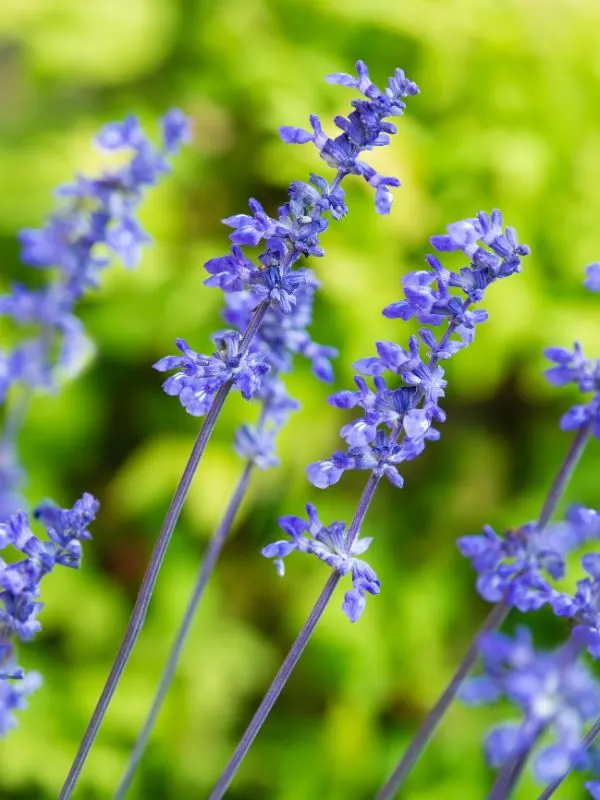
As a companion plant, Salvia (Salvia spp.) supports Knockout Roses by discouraging pests with its fragrant leaves, attracting pollinators to improve rose blossoms, and establishing aesthetic harmony with its vertical growth. Salvia’s mild water requirements complement those of roses, providing a harmonious coexistence in the garden.
Knockout Roses provide Salvia with shade, support, and moisture regulation, shielding it from harsh sunlight and boosting development. The roses’ continual bloom cycle attracts pollinators, which indirectly benefits Salvia’s pollination and seed production, promoting a fruitful collaboration.
5. Russian Sage (Perovskia atriplicifolia)
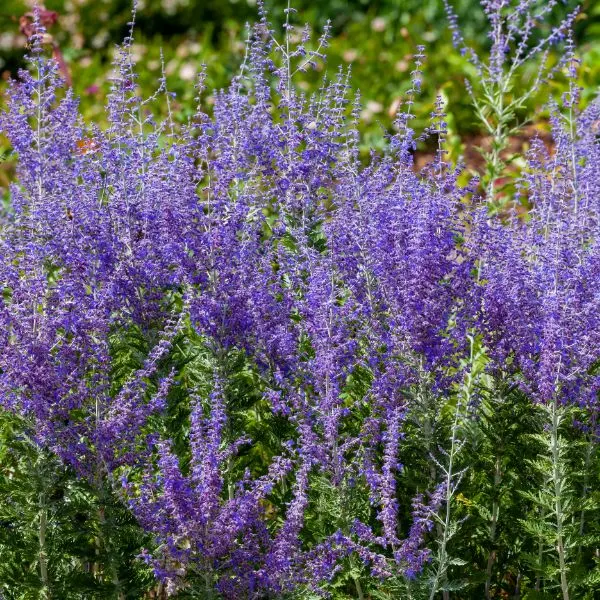
Russian Sage is an excellent companion plant for Knockout Roses. Its silver-gray leaves and tall, airy stems contrast nicely with the bushy shpe of the roses, providing depth and character to the garden scene.
Russian Sage’s fragrant leaves work as a natural repellent, preventing pests and safeguarding Knockout Roses from future infestations. Russian Sage’s drought tolerance compliments the water-wise properties of Knockout Roses, allowing them to coexist together with little water competition.
Russian Sage’s numerous purple-blue blossoms attract important pollinators such as bees and butterflies, resulting in increased pollination and stronger rose blooms. Overall, Russian Sage is a wonderful companion plant for Knockout Roses due to its aesthetic appeal, insect control, water efficiency, and pollinator attraction.
6. Daylilies (Hemerocallis spp.)
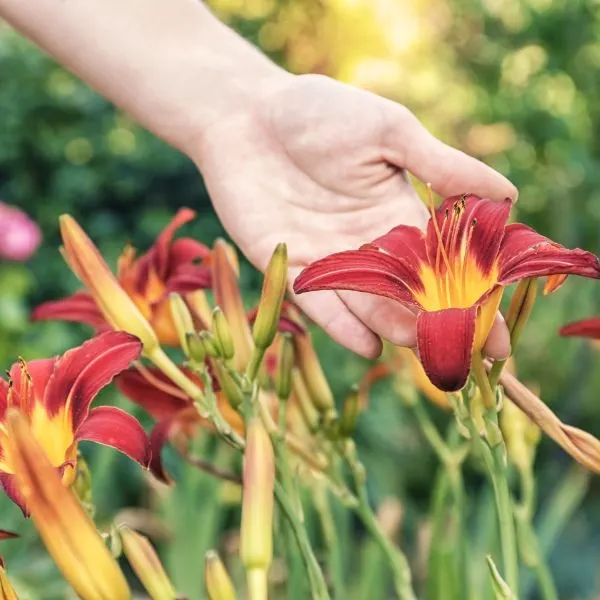
As a companion to Knockout Roses, daylilies have various advantages. When combined with roses, their remarkable and wide spectrum of flower colors and styles create a colorful and visually pleasing garden. The powerful and wide root systems of daylilies assist in improving soil structure and prevent erosion, which benefits the overall health of the garden and promotes the growth of Knockout Roses. Daylilies also have a lengthy flowering period, which extends the blooming season and provides pollinators with a constant source of nectar. This improves pollination for roses, resulting in more profuse blooms.
Furthermore, because of its little maintenance and tolerance to a variety of soil conditions, daylilies are ideal for growing alongside Knockout Roses. Overall, daylilies are an excellent companion plant for Knockout Roses due to their brilliant flowers, soil improvement, longer flowering, and pollinator attraction.
7. Coneflowers (Echinacea spp.)
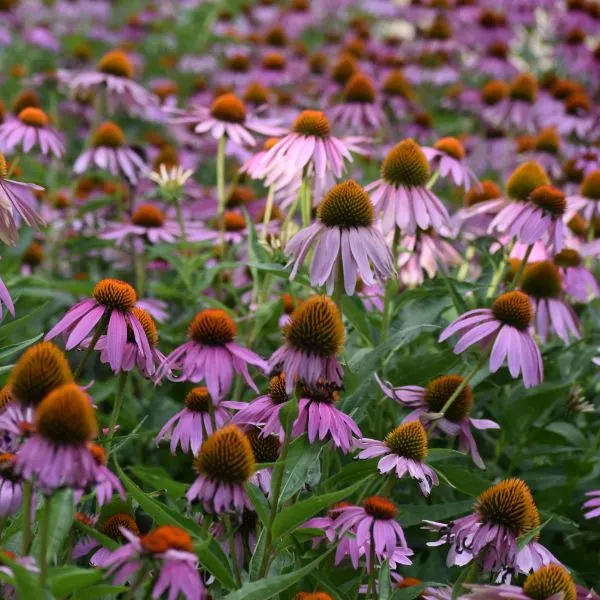
Coneflowers are excellent companion plants for Knockout Roses. When coupled with the roses, their gorgeous daisy-like blossoms in various brilliant hues, such as pink, purple, and white, provide a dramatic contrast, adding visual appeal to the garden. Coneflowers are well-suited to growing alongside roses since they are strong and resilient perennials that require little care and upkeep.
Furthermore, the nectar-rich blossoms of coneflowers attract helpful pollinators such as bees and butterflies, improving overall pollination and resulting in more plentiful blooms for roses. Coneflowers also have deep taproots that enhance soil structure, allowing for better water penetration and nutrient circulation, which benefits both plants. Coneflowers and Knockout Roses cohabit to create a harmonic and healthy garden show that provides beauty, pollinator support, and increased soil health.
8. Black-Eyed Susans (Rudbeckia spp.)
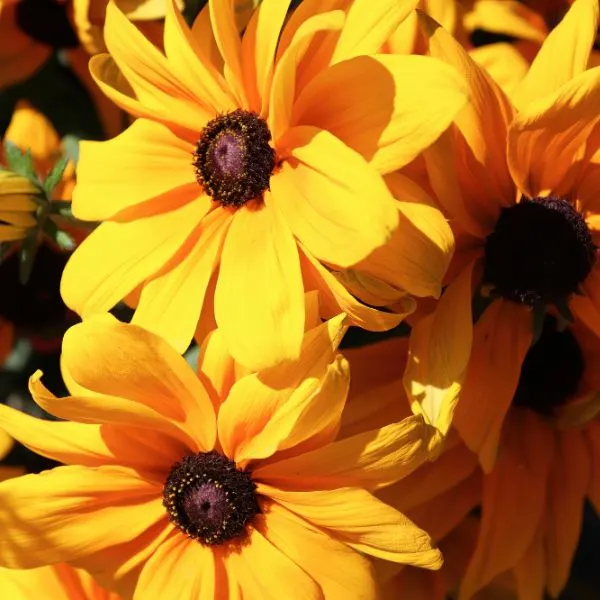
As a companion to Knockout Roses, Black-Eyed Susans provide various benefits. When coupled with the roses, their brilliant and lively yellow blossoms provide a magnificent contrast, increasing the overall appeal of the garden. Black-Eyed Susans, being members of the daisy family, attract helpful pollinators such as bees and butterflies, resulting in more excellent pollination and better flowering for roses.
These hardy and low-maintenance perennials may survive in situations similar to Knockout Roses, requiring little care and attention. Furthermore, their large root systems boost soil health by increasing aeration and nutrient circulation, encouraging both plants’ strong development. Black-Eyed Susans are a wonderful companion plant for Knockout Roses due to their fascinating look, pollinator attraction, ease of maintenance, and soil-enhancing capabilities.
9. Shasta Daisies (Leucanthemum superbum)
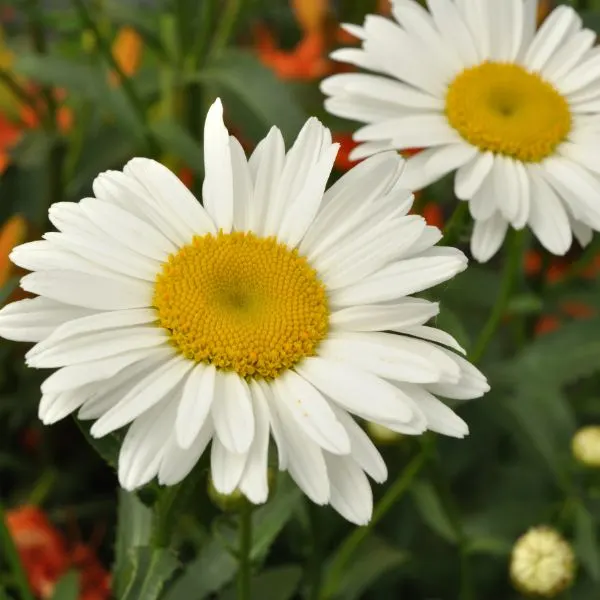
When planted with Knockout Roses, Shasta Daisies provide various benefits. Their traditional white petals and brilliant yellow centers make a stunning contrast against the vibrant roses, adding to the garden’s aesthetic attractiveness. The capacity of Shasta Daisies to attract helpful insects, particularly pollinators like bees and butterflies, aids in rose pollination, resulting in a better supply of brilliant flowers.
The robust and fibrous root systems of Shasta Daisies and Knockout Roses promote soil structure and aeration, supporting better root development. Shasta Daisies are low-maintenance and can survive a broad range of growth conditions, making them ideal for pairing with Knockout Roses. Shasta Daisies are a wonderful companion plant for Knockout Roses because of their aesthetic appeal, pollinator attraction, soil enhancement, and flexibility.
10. Coreopsis (Coreopsis spp.)
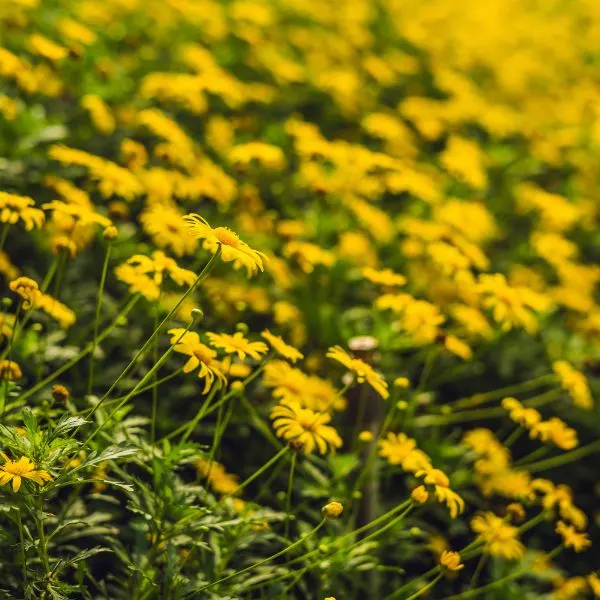
Coreopsis is an excellent companion plant for Knockout Roses. When combined with roses, their brilliant and colorful blossoms, available in a variety of hues, make a vivid and vibrant garden show. Coreopsis attracts pollinators such as bees and butterflies to the yard, increasing cross-pollination for both Coreopsis and Knockout Roses.
Coreopsis is a low-maintenance and drought-tolerant plant, making it an ideal companion for the water-saving Knockout Roses. Coreopsis’ thick and bushy growth style compliments the roses’ upright appearance, producing an aesthetically appealing contrast. The adaptability of Coreopsis to many soil types and growth situations makes it a flexible and easy-to-grow partner for Knockout Roses. Overall, the combination of brilliant flowers, pollinator attraction, low-maintenance characteristics, and aesthetic appeal makes Coreopsis an excellent companion plant for Knockout Roses in any garden setting.
11. Veronica (Veronica spp.)
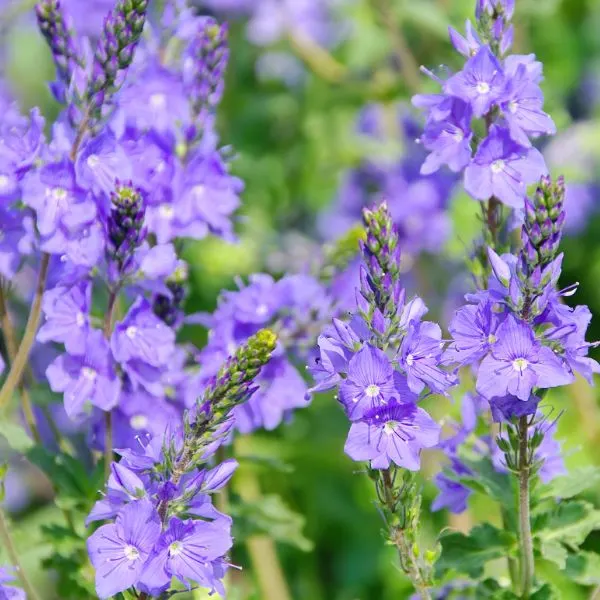
When planted with Knockout Roses, Veronica gives various benefits. When coupled with roses, its thin spikes of brilliant blooms in various colors of blue, purple, or pink provide a striking visual contrast and give depth to the landscape. Veronica’s nectar-rich blossoms attract essential pollinators like bees and butterflies, increasing cross-pollination and bloom output. Veronica’s compact and upright growth habit compliments the bushy appearance of Knockout Roses, providing a well-balanced and beautiful landscape.
Veronica’s capacity to flourish in full sun and tolerate well-drained soils corresponds to the growth preferences of Knockout Roses, making it a simple partner to incorporate into the garden. Overall, Veronica is a good companion plant for Knockout Roses due to its eye-catching blossoms, pollinator attraction, aesthetic harmony, and common growth requirements.
12. Penstemon (Penstemon spp.)
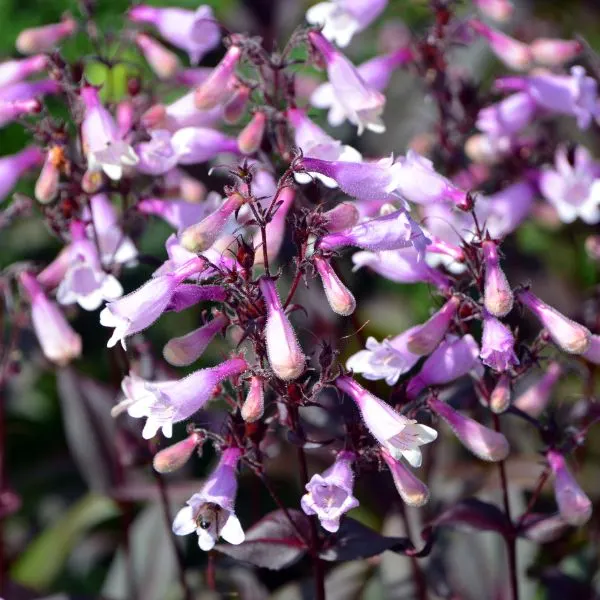
When planted with Knockout Roses, Penstemon provides several benefits. Penstemon gives a beautiful and eye-catching contrast to the rose blossoms, improving the overall aesthetic appeal of the garden, with its thin, tubular flowers available in a variety of brilliant hues. Penstemon’s nectar-rich blooms attract important pollinators such as bees and hummingbirds, resulting in greater pollination for roses and improved fruit development.
Furthermore, the deep-rooted structure of Penstemon increases soil aeration and drainage, aiding its development and the general soil health of the roses. Penstemon’s drought tolerance complements the water-wise properties of Knockout Roses, letting them coexist with little water competition. Penstemon is an ideal companion plant for Knockout Roses due to its beautiful blossoms, pollinator attraction, soil enhancement, and water efficiency.
13. Sedum (Sedum spp.)
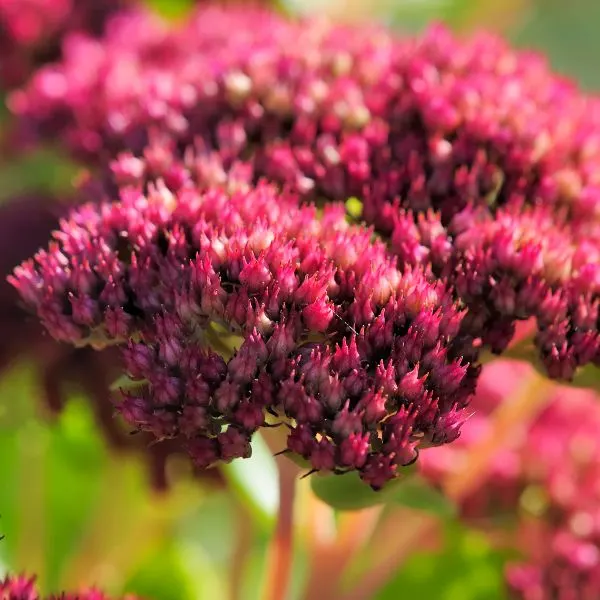
As a companion plant for Knockout Roses, Sedum has various advantages. When coupled with roses, its unusual succulent leaves and different hues, ranging from green to burgundy, make a pleasing contrast and add texture to the yard. The capacity of Sedum to survive dry circumstances and store water in its leaves makes it a perfect companion plant for the water-wise Knockout Roses since both plants can grow in comparable situations with minimum water requirements.
Furthermore, Sedum’s flat-topped clusters of blooms attract helpful pollinators such as bees and butterflies, resulting in improved pollination for roses and increased bloom output. Sedum’s low-maintenance nature matches the little care required by Knockout Roses, making it an appropriate and visually attractive companion plant choice. Sedum and Knockout Roses are desirable additions to the garden because of its gorgeous leaves, drought tolerance, pollinator appeal, and little maintenance.
14. Agastache (Agastache spp.)
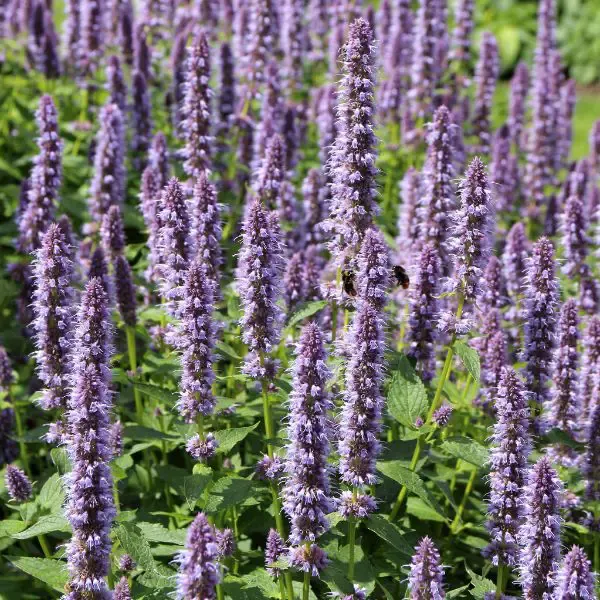
Agastache, often known as hyssop or hummingbird mint, has several benefits when planted alongside Knockout Roses. When coupled with roses, its brilliant and dramatic flower spikes in various colors of purple, pink, and orange provide a startling flash of color and visual interest to the yard. The fragrant leaf of Agastache provides a pleasant smell that functions as a natural repellent to pests, protecting the roses from infestation.
Furthermore, its nectar-rich blossoms attract important pollinators like hummingbirds and butterflies, increasing cross-pollination and encouraging stronger blooms. Agastache is also noted for its drought resistance and capacity to grow in hot, sunny circumstances, which complements Knockout Roses’ water-wise nature. Agastache is an ideal companion plant for Knockout Roses due to its brilliant blossoms, pest-repelling capabilities, pollinator attraction, and adaptability.
15. Tickseed (Coreopsis verticillata)
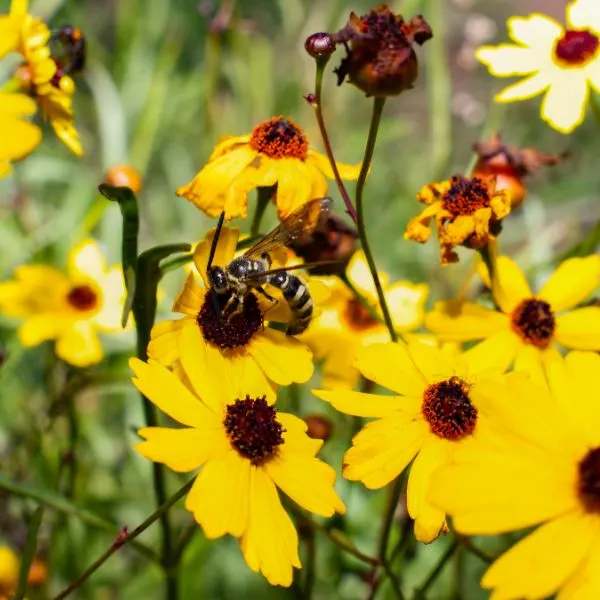
Tickseed is an excellent companion plant for Knockout Roses. When combined with roses, its delicate, daisy-like blossoms in a variety of hues, including yellow, pink, and red, provide a vivid and joyful display to the yard. Tickseed’s continual flowering nature attracts important pollinators like bees and butterflies, which leads to greater pollination for the roses and results in plentiful and vivid blooms. Furthermore, Tickseed’s low-growing, airy habit compliments the larger shape of Knockout Roses, producing an appealing visual contrast. Tickseed’s adaptability to many soil types and drought tolerance make it a low-maintenance companion plant that may cohabit peacefully with Knockout Roses. Tickseed is an ideal companion plant for Knockout Roses due to its bright blossoms, pollinator attraction, aesthetic harmony, and low-maintenance properties.
16. Bee Balm (Monarda spp.)
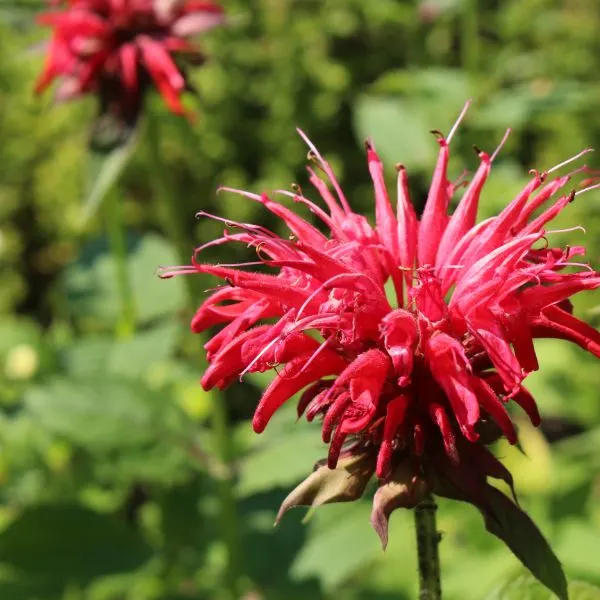
When planted with Knockout Roses, Shasta Daisies provide various benefits. Their traditional white petals and brilliant yellow centers make a stunning contrast against the vibrant roses, adding to the garden’s aesthetic attractiveness. The capacity of Shasta Daisies to attract helpful insects, particularly pollinators like bees and butterflies, aids in rose pollination, resulting in a better supply of brilliant flowers. Furthermore, the robust and fibrous root systems of Shasta Daisies and Knockout Roses promote soil structure and aeration, supporting better root development.
Shasta Daisies are low-maintenance and can survive a broad range of growth conditions, making them ideal for pairing with Knockout Roses. Shasta Daisies are a wonderful companion plant for Knockout Roses because of their aesthetic appeal, pollinator attraction, soil enhancement, and flexibility.
17. Achillea (Achillea spp.)
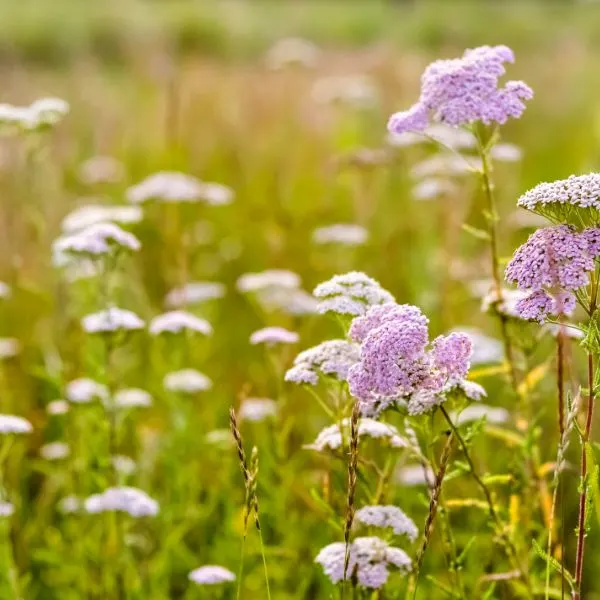
As a companion of Knockout Roses, Achillea, also known as Yarrow, provides various benefits. Its delicate, fern-like leaves and lovely flat-topped flower clusters provide an elegant and tactile contrast to the roses, boosting the garden’s overall beauty. The nectar-rich blossoms of yarrow attract helpful pollinators such as bees and butterflies, encouraging cross-pollination and enhanced blooms in roses.
The deep-rooted characteristic of yarrow enhances soil structure, increasing water retention and nutrient circulation, which benefits both plants’ general health and development. Achillea is also noted for its toughness and capacity to survive dry circumstances, making it a great companion for Knockout Roses’ water-wise nature. Achillea is a desirable and complementing companion plant for Knockout Roses due to its aesthetic appeal, pollinator attraction, soil enhancement, and drought tolerance.
18. Phlox (Phlox spp.)
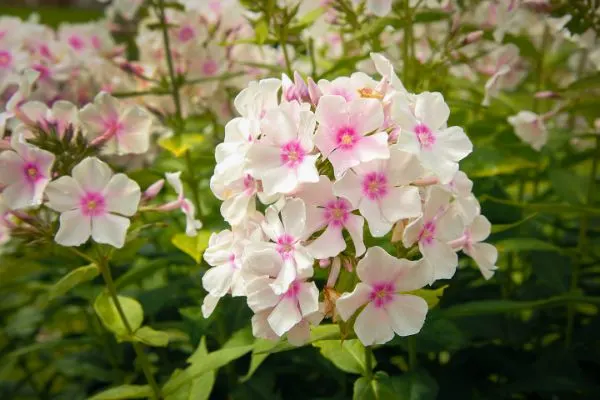
Phlox, with its bright and fragrant blossoms, is an excellent companion plant for Knockout Roses. Its rich colors, which include pink, purple, white, and red, complement the vibrant colors of the roses, resulting in a visually spectacular garden show.
The wonderful aroma of Phlox attracts helpful pollinators like butterflies and hummingbirds, boosting cross-pollination and increasing the overall biodiversity of the garden. Phlox’s thick growth habit creates an appealing backdrop for the bushier shape of Knockout Roses, providing texture and depth to the garden environment. Furthermore, Phlox is a low-maintenance plant that may survive in settings similar to Knockout Roses, making them excellent companions. Phlox is a fantastic choice to complement and enhance the attractiveness of Knockout Roses in the garden due to its brilliant colors, seductive aroma, pollinator appeal, and simplicity of growing.
19. Iris (Iris spp.)
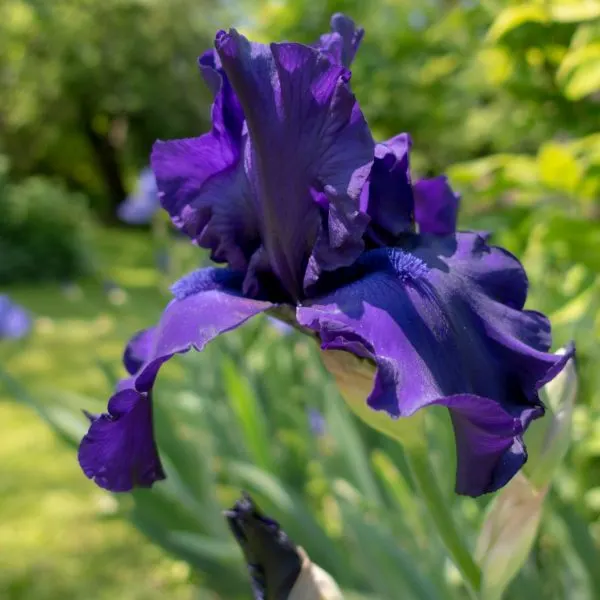
When combined with Knockout Roses in the Garden, Iris provides several benefits. Along with the roses, their exquisite and brilliant blossoms, available in a variety of colors, bring a touch of beauty and refinement to the environment. The spectacular flowers of Iris attract helpful pollinators such as bees and butterflies, resulting in improved pollination and more numerous blooms for roses.
The vertical and sword-like foliage of Iris contrasts nicely with the bushy appearance of Knockout Roses, providing an aesthetically pleasing combination. The rhizomatous root structure of the iris aids in soil stabilization, avoiding erosion, and promoting the general health of both plants. Furthermore, Iris is a practical and complementing companion to Knockout Roses, adding to a thriving and pleasant garden show due to its low care and ability to grow in a variety of soil types.
20. Lamb’s Ear (Stachys byzantina)
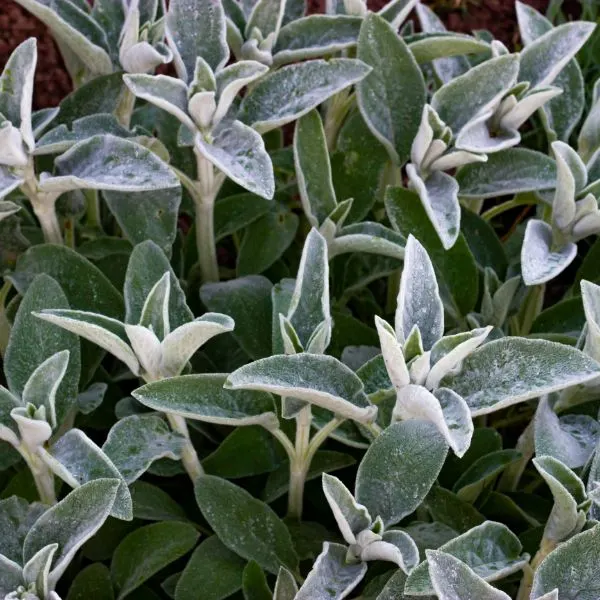
As a companion of Knockout Roses, Lamb’s Ear has several benefits. Its silky, silvery leaves contrast well with the rich green foliage of the roses, providing tactile complexity to the yard. Lamb’s Ear’s delicate, fluffy leaves can function as natural mulch, retaining soil moisture and reducing weed development around the roses.
The low-growing habit of Lamb’s Ear makes it an appealing ground cover, filling in gaps between roses and decreasing weed competition. This ground-hugging characteristic also functions as a living mulch, insulating and controlling the soil’s temperature.
Furthermore, Lamb’s Ear is a drought-tolerant plant, making it ideal with Knockout Roses’ water-saving nature. Lamb’s Ear is a wonderful companion plant for Knockout Roses because of its distinct look, weed-suppressing qualities, water efficiency, and visual appeal.
21. Calendula (Calendula officinalis)
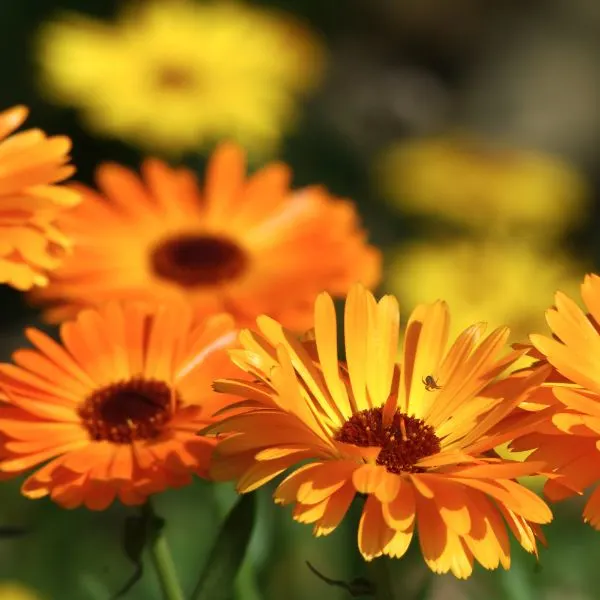
As a companion to Knockout Roses, Calendula provides several benefits. When planted beside the roses, their cheery, vivid orange and yellow blossoms provide a great contrast and visual intrigue. Not only do these vibrant flowers add to the overall beauty of the garden, but they also attract helpful insects like bees and butterflies, which aid with rose pollination. Calendula also possesses natural pest-repelling capabilities, which can help protect Knockout Roses from damaging insects.
Furthermore, Calendula is a low-maintenance plant that is easy to cultivate and care for, making it an ideal partner for Knockout Roses. Calendula is a fantastic and helpful companion plant for Knockout Roses due to its brilliant blossoms, pollinator appeal, pest-repellent qualities, and simplicity of growing.
22. Peonies (Paeonia spp.)

Peonies are an excellent companion plant for Knockout Roses. Their magnificent and prolific flowers, available in a variety of hues, offer a compelling show alongside the roses, adding to the garden’s overall appeal. The big, fragrant blooms of peonies attract pollinators such as bees, butterflies, and other helpful insects, resulting in greater pollination for roses and improved flower output.
Furthermore, the thick and bushy growth habit of peonies gives natural support and structure, lowering the chance of rose canes bending or breaking under the weight of their blossoms. The deep root structure of the peony increases soil aeration and drainage, which benefits both plants by increasing nutrient uptake and overall soil health. Peonies are an excellent companion plant for Knockout Roses due to their beautiful blossoms, pollinator attraction, rose support, and soil improvement features.
23. Yarrow (Achillea millefolium)
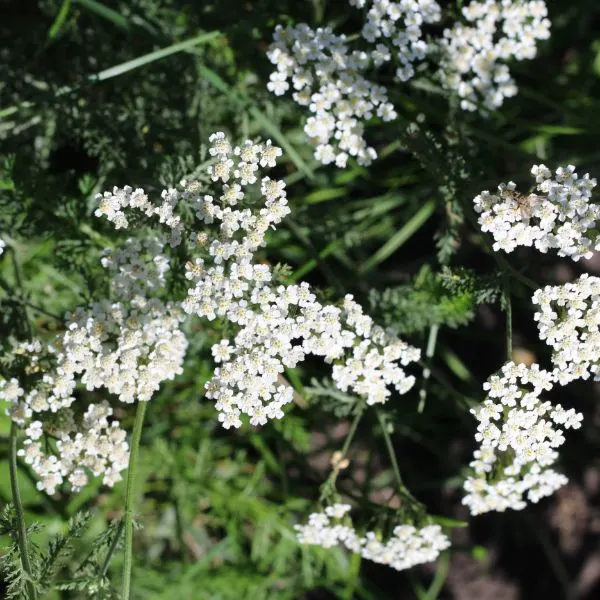
As a companion of Knockout Roses, Yarrow has various advantages. When combined with roses, its finely split, fern-like leaves and brilliant flower clusters offer texture and a flash of color to the yard. The fragrant blossoms of yarrow attract beneficial insects such as bees, butterflies, and ladybugs, resulting in improved pollination of roses and a more biodiverse and vibrant garden ecology.
Furthermore, the yarrow’s deep root system promotes soil structure and nutrient absorption, supporting better development in both the yarrow and Knockout Roses. The capacity of Yarrow to tolerate dry circumstances compliments the water-wise character of Knockout Roses, making them ideal partners. Yarrow is a wonderful and useful companion plant for Knockout Roses because of its aesthetic appeal, pollinator attraction, soil enhancement, and drought tolerance.
Alliums
24. Alliums (Allium spp.)
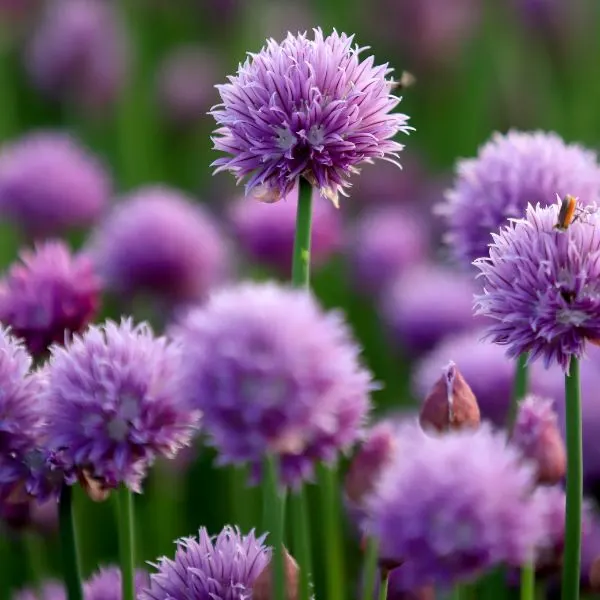
When combined with Knockout Roses, alliums provide various beneficial benefits. When coupled with roses, their distinctive globe-shaped flower heads in purple, white, and pink give a compelling and creative depth to the yard. Because of their pungent onion-like aroma, Alliums work as natural insect deterrents, helping to protect Knockout Roses from common garden pests. These plants also attract important pollinators such as bees and butterflies, which promotes greater pollination and increases the flowering potential of roses. Because of their compact and upright growth pattern, alliums may cohabit peacefully with the bushy variety of Knockout Roses without vying for space.
Alliums are low care and require little attention once established, making them an ideal and appealing companion plant for Knockout Roses. Alliums are a fantastic addition to any garden featuring Knockout Roses due to their distinctive floral structure, insect repellence, pollinator attraction, aesthetic appeal, and simplicity of care.
25. Ornamental Grasses (Various species)
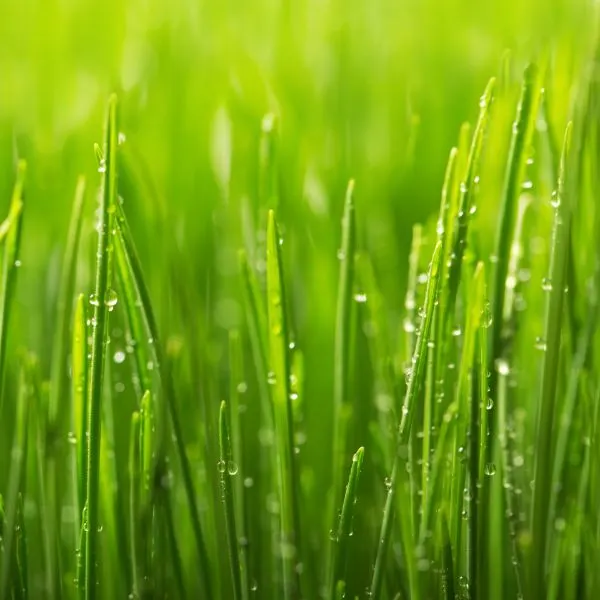
Planting ornamental grasses in a garden with Knockout Roses has various benefits for the overall landscape. Ornamental grasses’ beautiful and flowing foliage compliments the bushy appearance of Knockout Roses, bringing texture and movement to the yard.
These grasses operate as a natural support system for roses, minimizing spreading development and providing a visual contrast that improves both plants’ appeal. ornamental grasses provide year-round interest since many types preserve their structure and color even when roses are dormant.
Their deep and fibrous root systems promote soil stability, prevent erosion, and increase water absorption, all of which support the growth of ornamental grasses and roses. Ornamental grasses are a wonderful and harmonic partner for Knockout Roses because they provide visual appeal, structural support, year-round beauty, and soil enhancement.
Shrubs
26. Marigolds (Tagetes spp.)

Marigolds are an excellent companion plant for Knockout Roses. Their bright and cheery blossoms, which come in yellow, orange, and red tones, provide a pleasant burst of color to the yard, complimenting the beauty of the roses.
The powerful aroma of marigolds functions as a natural repellent, repelling pests and safeguarding Knockout Roses from potential infestations. These fragrant blossoms also attract helpful insects, such as ladybugs and lacewings, which help with pest management. Marigolds have a shallow root structure that does not compete with roses for water and nutrients, allowing both plants to grow beside each other.
Marigolds are simple to cultivate and require little care, making them an ideal companion plant for Knockout Roses. Overall, marigolds are a fantastic addition to the garden with Knockout Roses because of their brilliant colors, insect defense, pollinator appeal, and low-maintenance attributes.
Bad Companion Plants for Knockout Roses
1. Black Walnut
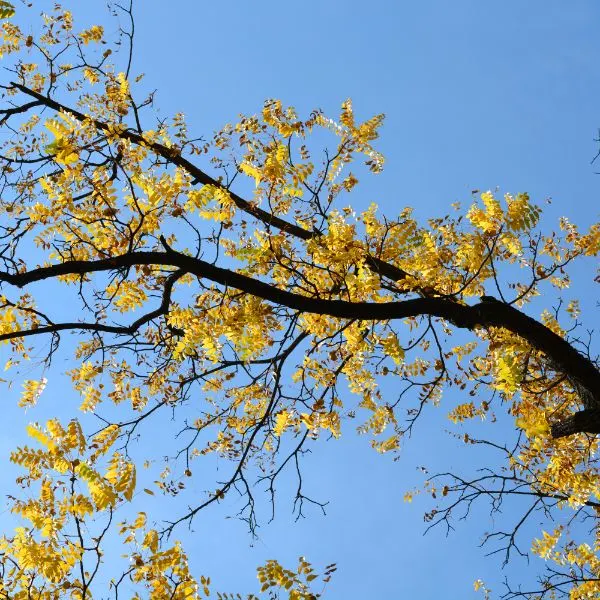
Planting Black walnuts near Knockout Roses can be harmful. Juglone, a poisonous chemical produced by Black Walnut trees, is emitted through their roots, leaves, and nuts. Many plants, including Knockout Roses, can be inhibited in their growth and development by Juglone, resulting in stunted growth, yellowing foliage, and even death.
The presence of Black walnuts in the neighborhood might have a negative influence on the roses’ health and vigor, rendering them susceptible to disease and insect infestations. As a result, it is preferable to avoid growing Knockout Roses near Black Walnut trees to ensure their healthy growth and development.
2. Boxwood
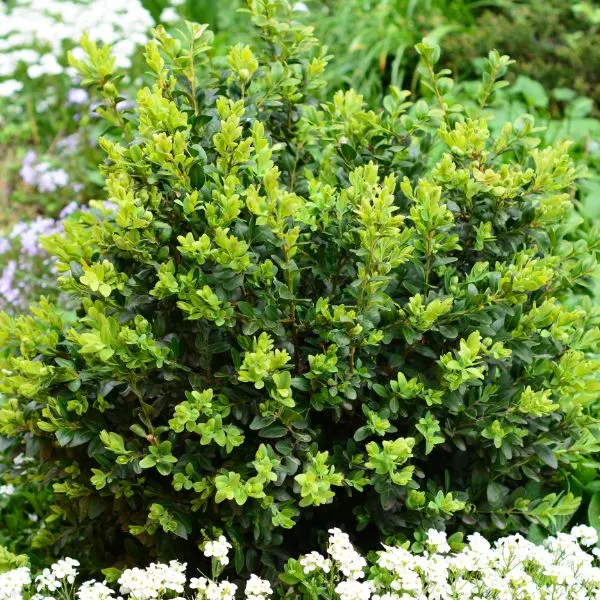
Planting Boxwood with Knockout Roses can be harmful to both plants. Boxwood has shallow and thick root systems that compete for important nutrients and water with roses, resulting in restricted growth and diminished vigor in both species. The thick foliage of Boxwood causes shadow and restricts air circulation around the roses, fostering humid circumstances that might promote the development of fungal infections.
The differing water requirements of Boxwood and Knockout Roses might present irrigation concerns, as Boxwood loves continuously moist soil, whilst Knockout Roses flourish with more moderate watering. Overall, Boxwood’s closeness to Knockout Roses might impede their development and health, making it a poor companion option.
3. Blackberry Bushes

Planting Blackberry Bushes near Knockout Roses might be harmful. Blackberry bushes are quick to spread and can soon take over a yard, overpowering the delicate development of Knockout Roses. The thorny canes of the blackberry can also cause damage to the rose bushes, resulting in sores and subsequent infections.
Blackberry bushes compete with roses for vital resources such as sunshine, water, and nutrients, impeding rose development and blossoming. Because of their invasive nature and competitive traits, blackberry bushes are poor companions for Knockout Roses, perhaps resulting in congestion and impaired overall garden health.
4. Bamboo
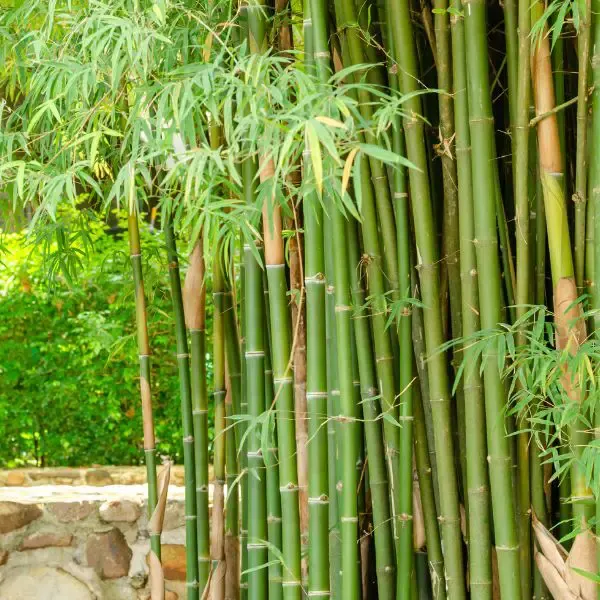
Planting bamboo near Knockout Roses can have a number of undesirable consequences. Bamboo is recognized for its aggressive growth and spreading tendency, which allows it to swiftly overpower and outcompete roses for resources such as sunshine, water, and nutrients. Bamboo’s deep and widespread root system can disturb the root zone of Knockout Roses, causing root damage and inhibiting development.
The tall and dense canopy of bamboo can cause excessive shadowing, restricting sunlight access for roses, which requires enough sunshine for proper flowering. In conclusion, planting bamboo alongside Knockout Roses can result in overcrowding, resource competition, root disturbance, and lower sunshine exposure, all of which can harm the roses’ health and vitality.
5. Morning Glory
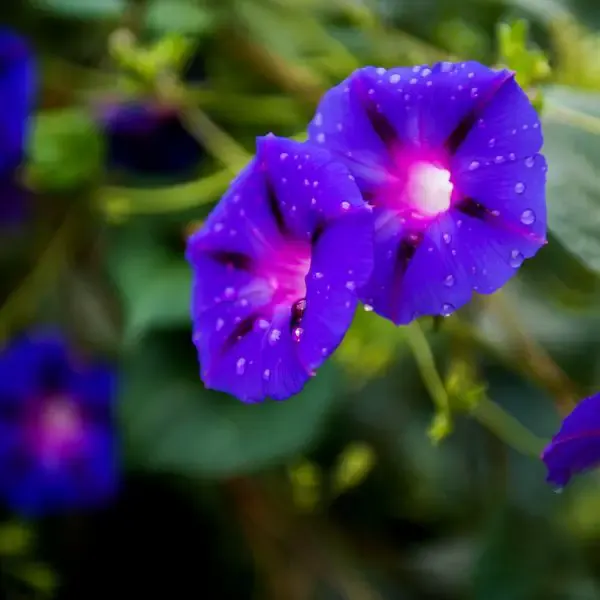
Morning Glory may become invasive, climbing and burying Knockout Roses. Its robust growth may outcompete roses for resources like sunshine, water, and nutrients, resulting in decreased rose growth and diminished flowering.
Morning Glory’s vast root system can entwine with rose roots, potentially causing root damage and impairing rose health and vigor. Planting Morning Glory beside Knockout Roses might result in an uneven and harmful garden environment.
6. Wisteria

Wisteria’s vigorous growth and climbing tendency can overpower and suffocate the roses, resulting in less sunshine exposure and stunted development. , the robust root structure of Wisteria may compete for important nutrients and water, depriving the roses of vital resources. This competition and shadowing can wilt the roses, reducing their general health and flowering capacity.
FAQs
How do you keep Knock Out roses blooming?
By removing spent blooms, i.e., Deadheading, your Knockout Roses will be able to focus their energy on producing new blooms more quickly. Remove fading blossoms as soon as you notice them or once a week.
How do I make my knockout roses thicker?
We discovered that cutting just above an outward-facing bud encourages a more prominent and bushier rose bush. Knock Out Roses can be softly clipped throughout the active growth season. Deadheading wasted flowers or clusters promotes the production of new buds and re-blooming.
Where are the best places to plant Knock Out roses?
Knock Out roses may be planted almost anyplace in your yard as long as there is enough sunlight. They do very well when planted in south and east-facing places with plenty of sunshine. They tolerate partial shade well; however, blooming may be diminished.
Do Knock Out roses like fertilizer?
The Knock Out Rose Family performs admirably even when not fertilized. If you want to give them a boost, wait until the roses have established themselves and gone through one bloom cycle before fertilizing.
Do roses like the sulfate of potash?
During their active development stage, feed your roses with well-rotted manure or compost on a regular basis. Because blood and bone are deficient in potassium, they should always be supplemented with potassium sulfate.
Is cow manure good for Knock Out roses?
In a nutshell, cow dung is fantastic for roses! It has a lot of nitrogen, which promotes leaf growth, and it also contributes organic matter to the soil, which aids in drainage and aeration. However, don’t use too much cow dung since it will burn the roots of your roses.
What is the best compost for roses?
The best compost for roses is well-matured compost that incorporates well-composted manure. If your soil is alkaline, you will need to use specialized compost to raise the pH to 6.5. Bonemeal can also be used at specific periods to encourage healthy stem development. It is critical to apply compost on a regular basis.
Conclusion
Knockout Roses have the added benefit of being low-maintenance and quite simple to care for once established. Once the plants have settled, they usually require very little fertilizer. Knockout Roses have various advantages, including cleansing the air, inducing relaxation by lowering blood pressure, improving skin radiance, and attracting pollinators, which adds value to the landscape.
While Knockout Roses provide various benefits, it is important to know that all components of the plant are non-edible and harmful if consumed. Their architectural growth pattern, on the other hand, gives year-round interest to the environment and compliments other plants that grow in similar conditions.
When planting Knockout Roses, use container-grown nursery plants in the spring or early fall. Their development rates differ per species, with the majority growing slowly. While a one-gallon plant may bloom in its first year, reaching full size might take up to a decade.
To guarantee effective development, soil conditions must be loose, well-draining, and somewhat acidic in pH. To satisfy the special soil needs of Knockout Roses, elevated planting areas made of loose, porous soil are frequently used.
More companion plants
